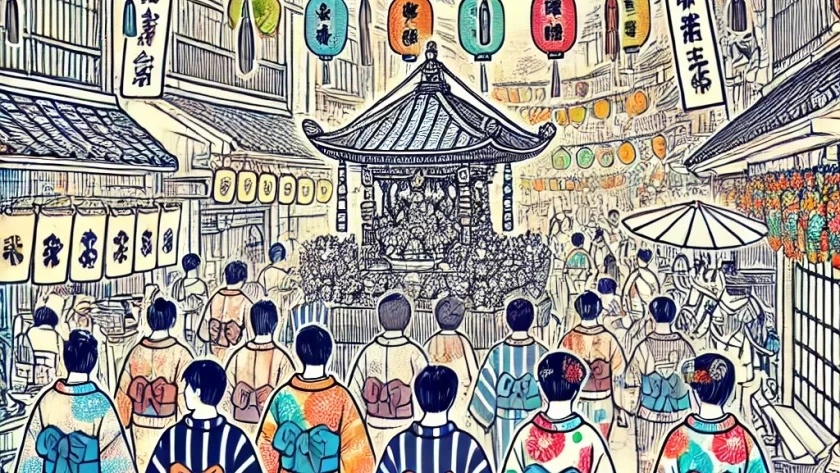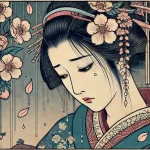まつり [Matsuri]
藤井風 [FUJII Kaze]
Words & Music : 藤井風 [FUJII Kaze]
“Matsuri” is a digital single by FUJII Kaze, released in 2022.
- 祭り(まつり) [matsuri] : festival
This song uses the concept of Japanese festivals as a key theme. Many Japanese festivals are accompanied by music and dancing, and these elements are reflected in the song and its music video.
Festivals often have religious origins, with many celebrating themes like bountiful harvests, prosperity in business, protection from illness, and peace. Moreover, foreign events such as Halloween and Christmas are also sometimes referred to as “matsuri,” shifting the meaning to simply a fun event.
This song carries strong Japanese elements, so it’s best to listen while imagining Japanese festivals. Although the lyrics don’t follow a clear narrative, I will explain each line and add related notes about “matsuri” as needed.
愛しか感じたくもない
aishika kanjitaku mo nai
もう何の分け隔てもない
mō nan no wakehadate mo nai
まとめてかかってきなさい
matomete kakatte kinasai
今なら全て受け止めるから
ima nara subete uketomeru kara
- 愛(あい) [ai] : love
- 感じる(かんじる) [kanjiru] : feel
- 分け隔て(わけへだて) [wakehadate] : discrimination
- ない [nai] : none
- まとめる [matomeru] : gather
- 今 [ima] : now
- 全て [subete] : everything
- 受け止める [uketomeru] : accept
(translation) “I only want to feel love
There’s no discrimination anymore
Come at me all at once
Because now I can accept everything”
The phrase “まとめてかかってきなさい / matomete kakatte kinasai” (=Come at me all at once) is quite a unique expression used in battles with multiple opponents, but you may hear it in movies or manga. I imagine a sumo wrestler saying it to children. However, in this context, it might be conveying a concept of equality.
で、一体何がほしいわけ
de ittai nani ga hoshī wake
誰に勝ちたいわけ
dare ni kachitai wake
なかなか気づけんよね
nakanaka kizuken yo ne
何もかも既に持ってるのにね
nanimo kamo sudeni motteru no ni ne
- 何(なに) [nani] : what
- 欲しい(ほしい) [hoshī] : want
- 誰(だれ) [dare] : who
- 勝つ(かつ) [katsu] : win
- なかなか…ない(なかなか…ない) [nakanaka… nai] : hard to…
- 気づく(きづく) [kizuku] : realize
- 何もかも(なにもかも) [nanimo kamo] : everything
- すでに(すでに) [sudeni] : already
- 持つ(もつ) [motsu] : have
(translation) “So, what exactly do you want?
Who are you trying to defeat?
It’s hard to realize, isn’t it?
Even though you already have everything”
This is a characteristic of Fujii’s lyrics, where many lines, like the first two, are quite colloquial and casual. The third line contains a dialect. Sometimes it gets quite free-form, which makes it interesting.
花祭り 夏祭り
hana matsuri natsu matsuri
何でも好きに選びな
nandemo suki ni erabina
あなたの心の中咲かせな(えいっ)
anata no kokoro no naka sakasena (ei)
秋祭り 冬休み
aki matsuri fuyu yasumi
その閉じた心 今こじ開けな
sono tojita kokoro ima kojiakena
あっけーな
akkena
ラッセーラ
rassēra
- 花(はな) [hana] : flower
- 夏祭り(なつまつり) [natsumatsuri] : summer festival
- 何でも(なんでも) [nandemo] : anything
- 好きに(すきに) [suki ni] : freely
- 選ぶ(えらぶ) [erabu] : choose
- あなた(あなた) [anata] : you
- 心(こころ) [kokoro] : heart
- 中(なか) [naka] : inside
- 咲かせる(さかせる) [sakaseru] : bloom
- 秋祭り(あきまつり) [akimatsuri] : autumn festival
- 休み(やすみ) [yasumi] : break
- 閉じる(とじる) [tojiru] : close
- こじ開ける(こじあける) [kojiakeru] : pry open
- 開ける(あける) [akeru] : open
(translation) “Flower Festival, Summer Festival
Choose whatever you like
Let your heart bloom (Hey!)
Autumn Festival, Winter Break
Pry open that closed heart now
Akkena
Rassēra”
Let’s start by learning the seasonal words that appear here.
- 春(はる) [haru] : spring
- 夏(なつ) [natsu] : summer
- 秋(あき) [aki] : autumn
- 冬(ふゆ) [fuyu] : winter
Japan’s distinct four seasons are a result of its climate, and each season has fostered unique landscapes and cultures. (The idea that “Japan’s four seasons are wonderful” has become a cliché, and nowadays, with fewer things for Japan to be proud of, it’s sometimes used ironically in internet memes.) Still, if you’re visiting Japan as a tourist, you should enjoy this aspect.
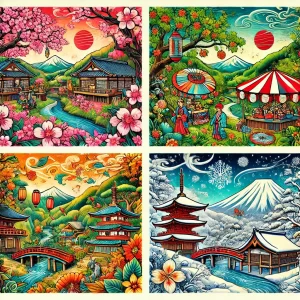
“花祭り / hana matsuri” is a Buddhist festival, symbolized by cherry blossoms, marking a spring festival. I’m not sure if everyone is familiar with this term
“夏祭り / natsu matsuri” is linked to the “盆 / Bon” festival, where people give thanks to their ancestors. This festival is one of the most widely celebrated, and there are many famous events held across Japan during this time.
“秋祭り / aki matsuri” is a festival held in autumn to give thanks to the gods for a bountiful harvest, particularly rice and other crops.
“冬休み / fuyu yasumi” refers to the break taken for the Japanese New Year (正月 / Shōgatsu). Since the New Year celebrations have religious origins, they can also be considered a type of festival.
The command form in “選びな / erabina” is a contracted form of “なさい / nasai” (=choose freely).
“らっせーら / rassēra” is a chant used in the famous Nebuta Festival wiki in Aomori Prefecture wiki, and it rhymes with “あけな / akena.”
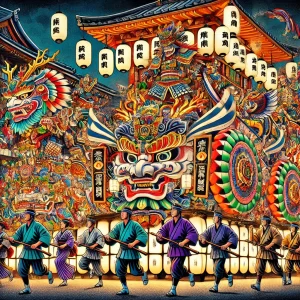
“えいっ / ei” is a typical Japanese cheer, although it’s not specifically related to festivals.
祭り 祭り
matsuri matsuri
毎日愛しき何かの
mainichi itoshiki nanika no
祭り 祭り
matsuri matsuri
あれもこれもが大当たり
are mo kore mo ga ōatari
- 毎日(まいにち) [mainichi] : every day
- 愛しい(いとしい) [itoshī] : beloved
- 何か(なにか) [nanika] : something
- あれ [are] : that
- これ [kore] : this
- 大当たり(おおあたり) [ōatari] : big win
(translation) “Festival, festival
Every day is a beloved something
Festival, festival
This and that, it’s all a big win”
There are truly many festivals held in Japan. I’ll provide a link to the list of Japanese festivals wiki from the Japanese Wikipedia page. Not all of them are traditional, but the saying that there’s a festival happening somewhere every day isn’t entirely false.
The phrase “ōatari” (big win) seems to be used in a positive sense here, but it often brings to mind the image of games like shooting galleries or lotteries commonly seen at summer festival stalls.
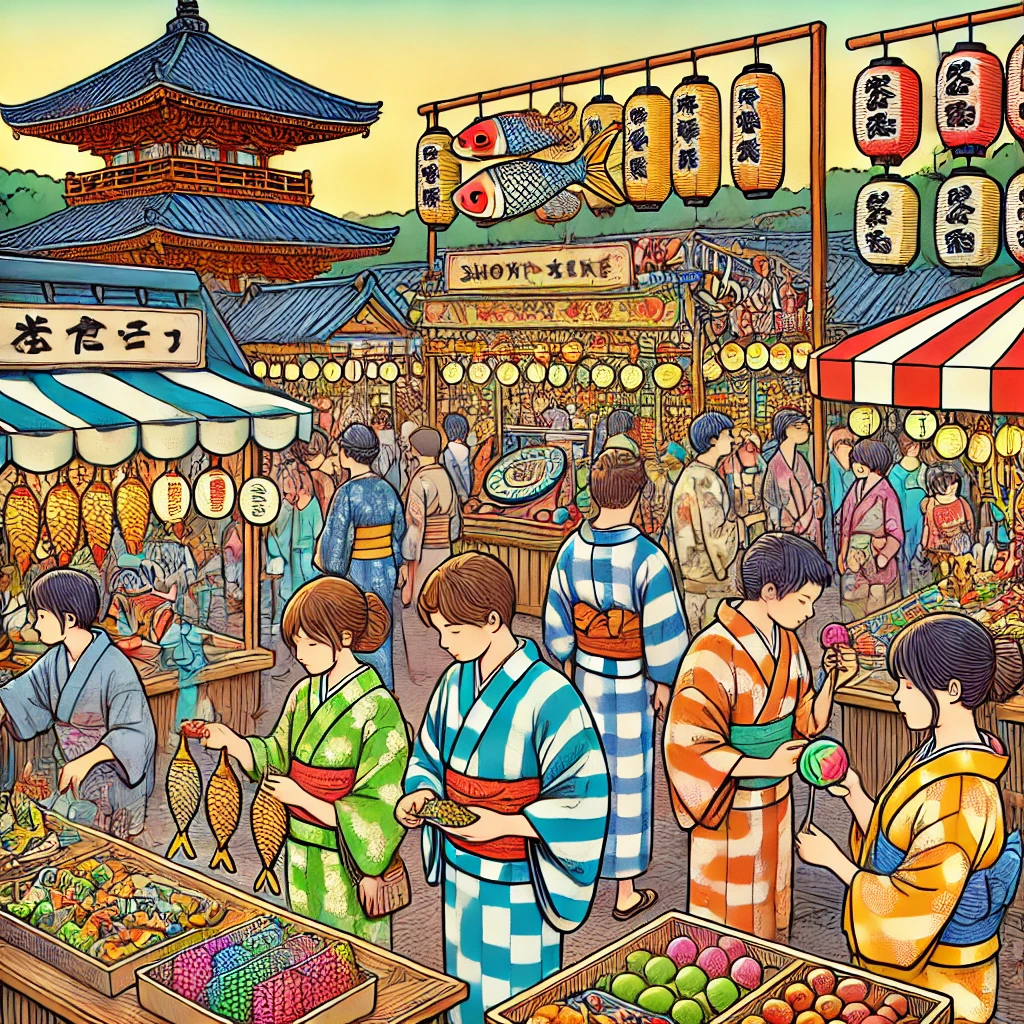
比べるものは何もない
kuraberu mono wa nanmo nai
勝ちや負けとか一切ない
kachi ya make toka issai nai
ない ない
nai nai
- 比べる(くらべる) [kuraberu] : compare
- 何も(なにも) [nanimo] : nothing
- 負け(まけ) [ make] : loss
- 一切(いっさい) [issai] : none
(translation) “There’s nothing to compare
Winning and losing don’t matter at all
None, none”
I believe Fujii’s lyrics contain elements of his own philosophy, and while I won’t go into a deep explanation, the concept of “there’s no point in worrying about winning or losing” is repeated throughout. This concept isn’t something unique to Japan, but it does appear in Japanese philosophies such as Zen.
何も知ったこっちゃない
nanimo shitta koccha nai
好きにしてください
suki ni shite kudasai
何も知ったこっちゃない
nanimo shitta koccha nai
好きにしてください
suki ni shite kudasai
- 知る(しる) [shiru] : know
- 好きにする(すきにする) [suki ni suru] : do as you like
(translation) “I don’t care about anything
Do as you please
I don’t care about anything
Do as you please”
僕が激しく泣いたせいで
boku ga hageshiku naita sei de
君が派手に笑ったせいで
kimi ga hade ni waratta sei de
夏の暑さ身体を焦がして
natsu no atsusa karada o kogashite
冬の厳しさ骨身に沁みた
fuyu no kibishisa honemi ni shimita
- 僕(ぼく) [boku] : I
- 激しい(はげしい) [hageshī] : intense
- 泣く(なく) [naku] : cry
- せい [sei] : because of
- 君(きみ) [kimi] : you
- 派手に(はでに) [hade ni] : extravagantly
- 笑う(わらう) [warau] : laugh
- 暑さ(あつさ) [atsusa] : heat
- 体(からだ) [karada] : body
- 厳しい(きびしい) [kibishī] : harsh
(translation) “Because I cried intensely
And you laughed extravagantly
The summer heat scorched my body
And the winter’s harshness seeped into my bones”
真っ平らに生きられたら
mattaira ni ikiraretara
真っ直ぐにそこへ行けたかな
massugu ni soko e iketa ka na
っしゃ今なら遅くはねーから
ssha ima nara osoku wa nē kara
っしゃ っしゃ っしゃ っしゃ
ssha ssha ssha ssha
- 真っ平(まったいら) [mattaira] : flat
- 生きる(いきる) [ikiru] : live
- 真っ直ぐ(まっすぐ) [massugu] : straight
- そこ [soko] : there
- 行く(いく) [iku] : go
- 遅い(おそい) [osoi] : late
(translation) “If I could have lived a flat life
Could I have gone straight there?
It’s not too late now
Shā, shā, shā, shā”
“まったいら / mattaira” and “まっすぐ / massugu” use the word “ま / ma,” which means “true” or “pure.” Another example is “まっか / makka,” where “まっか / makka” means “true red” as opposed to “あか / aka” (=red).
“っしゃ / ssha” is an extremely colloquial expression (if it can even be called a word) and is likely a variation of “よっしゃ / yossha.” Its original meaning is something like “Yes” or “Good.”
花祭り 夏祭り
hana matsuri natsu matsuri
生まれゆくもの死にゆくもの
umareyuku mono shinuyuku mono
全てが同時の出来事
subete ga dōji no dekigoto
秋祭り 冬休み
aki matsuri fuyu yasumi
みな抱きしめたら踊りなさいな
mina dakishimetara odorinasai na
- 生まれる(うまれる) [umareru] : be born
- 死ぬ(しぬ) [shinu] : die
- 同時(どうじ) [dōji] : simultaneously
- 出来事(できごと) [dekigoto] : event
- 抱きしめる(だきしめる) [dakishimeru] : embrace
- 踊る(おどる) [odoru] : dance
(translation) “Flower Festival, Summer Festival
The things being born and the things dying
All happen simultaneously
Autumn Festival, Winter Break
Embrace them all and then dance”
When it comes to festival dances, the most famous one is Tokushima Prefecture wiki‘s “Awa Odori wiki.” “Yosakoi” from Kōchi prefecture wiki is also well-known.
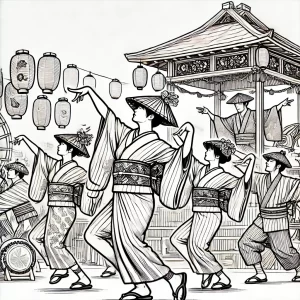
祭り 祭り
matsuri matsuri
毎日愛しき何かの
mainichi itoshiki nanika no
祭り 祭り
matsuri matsuri
あれもこれもが有り難し
are mo kore mo ga arigatashi
苦しむことは何もない
kurushimu koto wa nanimo nai
肩落とすこた一切ない
kata otosu kota issai nai
ない ない
nai nai
- ありがたい(ありがたい) [arigatai] : thankful
- 苦しむ(くるしむ) [kurushimu] : suffer
- 肩を落とす(かたをおとす) [kata o otosu] : be discouraged
(translation) “Festival, festival
Every day is a beloved something
Festival, festival
This and that are all blessings
There’s no need to suffer
No reason to hang your head
None, none”
Let me explain “ありがたい / arigatai.”
“ある / aru” is the opposite of “ない / nai,” and means “exist.” “ありがたい / arigatai” literally means “can’t exist,” implying something rare, and from there it took on the meaning of something joyful or deserving of gratitude. This is also the origin of the word “ありがとう / arigatō” (=thank you).
Since festivals have their origins in expressing gratitude to the gods, this word fits well with the theme of the song.
祭り 祭り
matsuri matsuri
毎日愛しき何かの
mainichi itoshiki nanika no
祭り 祭り
matsuri matsuri
あれもこれもが有り難し
are mo kore mo ga arigatashi
苦しむことは何もない
kurushimu koto wa nanimo nai
肩落とすこた一切ない
kata otosu kota issai nai
ない ない
nai nai
何も知ったこっちゃない
nanimo shitta koccha nai
好きにしてください
suki ni shite kudasai
何も知ったこっちゃない
nanimo shitta koccha nai
何にせよめでたい
nan ni seyo medetai
- 何にせよ(なににせよ) [nani ni seyo] : whatever it may be
- めでたい [medetai] : happy, auspicious
(translation) “Whatever it may be, it’s happy”
“めでたい / medetai” translates to “auspicious” in English. It’s often used in celebrations like New Year’s or weddings, regardless of the specific context.
This song contains elements of Fujii’s philosophy, such as equality, the absence of winning and losing, and detachment from desire, which might have a Japanese feel to them. It’s hard to explain how these are combined with Japanese festivals, but they may create a unique sense of harmony.
Music-wise, while the song has a refined hip-hop vibe, it also features rhythms reminiscent of Japanese folk songs, especially at the beginning of the chorus. Syncopation is not used.
The music video clearly showcases Japanese elements in a refined way, although it feels almost too perfect, giving it the vibe of being directed towards foreign tourists.
Thanks for reading! Feel free to comment if you have any feedback or questions.
Follow me on X.
